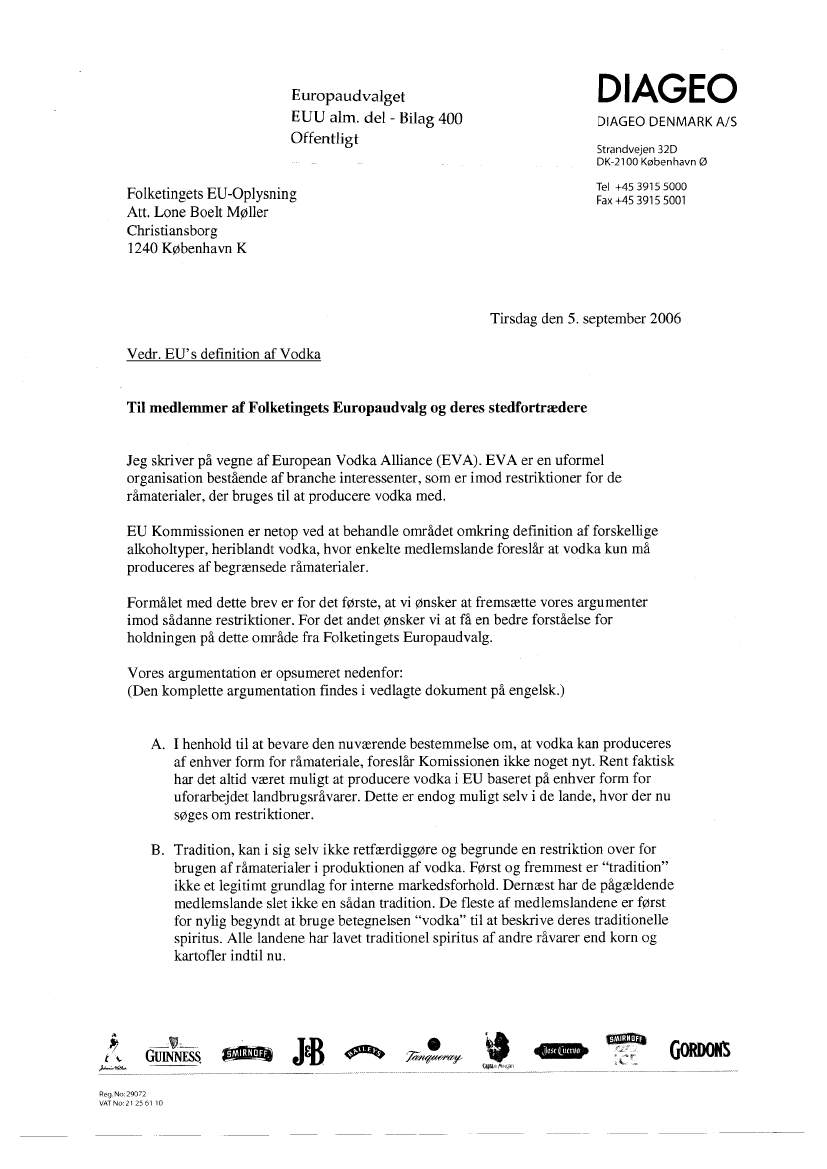
Europaudvalget
EUU alm. del - Bilag 400
Offentligt
DIAGEO
DIAGEO DENMARK A/S
Strandvejen 32D
DK-2100 København Ø
Tel +45 3915 5000
Fax +45 3915 5001
Folketingets EU-Oplysning
Att. Lone Boelt Møller
Christiansborg
1240 København K
Tirsdag den 5. september 2006
Vedr. EU' s definition af Vodka
Til medlemmer af Folketingets Europaudvalg og deres stedfortrædere
Jeg skriver på vegne af European Vodka Alliance (EVA). EVA er en uformel
organisation bestående af branche interessenter, som er imod restriktioner for de
råmaterialer, der bruges til at producere vodka med.
EU Kommissionen er netop ved at behandle området omkring definition af forskellige
alkoholtyper, heriblandt vodka, hvor enkelte medlemslande foreslår at vodka kun må
produceres af begrænsede råmaterialer.
Formålet med dette brev er for det første, at vi ønsker at fremsætte vores argumenter
imod sådanne restriktioner. For det andet ønsker vi at få en bedre forståelse for
holdningen på dette område fra Folketingets Europaudvalg.
Vores argumentation er opsumeret nedenfor:
(Den komplette argumentation findes i vedlagte dokument på engelsk.)
A. I henhold til at bevare den nuværende bestemmelse om, at vodka kan produceres
af enhver form for råmateriale, foreslår Komissionen ikke noget nyt. Rent faktisk
har det altid været muligt at producere vodka i EU baseret på enhver form for
uforarbejdet landbrugsråvarer. Dette er endog muligt selv i de lande, hvor der nu
søges om restriktioner.
B. Tradition, kan i sig selv ikke retfærdiggøre og begrunde en restriktion over for
brugen af råmaterialer i produktionen af vodka. Først og fremmest er "tradition"
ikke et legitimt grundlag for interne markedsforhold. Dernæst har de pågældende
medlemslande slet ikke en sådan tradition. De fleste af medlemslandene er først
for nylig begyndt at bruge betegnelsen "vodka" til at beskrive deres traditionelle
spiritus. Alle landene har lavet traditionel spiritus af andre råvarer end korn og
kartofler indtil nu.
t&
GUINNESS.
s
MIR
FF,
J
41)
474340>
7~".."71
,4
Caplam
II
gMIFINI] FF
;.ilose Cuero°
GORDMIS
Reg. No: 29072
VAT No:21 25 61 10